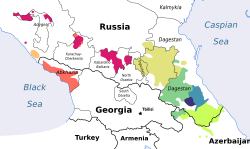Aghul language
Aghul is a Lezgic language spoken by the Aghuls in southern Dagestan, Russia and in Azerbaijan. It is spoken by about 33,200[1] people (2020 census). ClassificationAghul belongs to the Eastern Samur group of the Lezgic branch of the Northeast Caucasian language family. Glottolog splits the Aghul language between the Qushan/Koshan group and other Aghul dialects due to the Qushan dialects being unintelligible with the other dialects. Geographic distributionIn 2002, Aghul was spoken by 28,300 people in Russia, mainly in Southern Dagestan, as well as 32 people in Azerbaijan.[2] Related languagesThere are nine languages in the Lezgian language family, namely: Aghul, Tabasaran, Rutul, Lezgian, Tsakhur, Budukh, Kryts, Udi and Archi. PhonologyAghul has contrastive epiglottal consonants.[3] Aghul makes, like many Northeast Caucasian languages, a distinction between tense consonants with concomitant length and weak consonants. The tense consonants are characterized by the intensiveness (tension) of articulation, which naturally leads to a lengthening of the consonant, so they are traditionally transcribed with the length diacritic. The gemination of the consonant itself does not create its tension, but morphologically tense consonants often derive from adjoining two single weak consonants. Some[which?] Aghul dialects have a large number[vague] of permitted initial tense consonants.[3] Vowels
Consonants
AlphabetThe Aghul alphabet was devised in the 1990s. Ever since then, it has been used as a language of education, with primers, textbooks, and dictionaries published.[6]
Grammar
CaseThere are four core cases: absolutive, ergative, genitive, and dative, as well as a large series of location cases. All cases other than the absolutive (which is unmarked) and ergative take the ergative suffix before their own suffix. AdjectivesIndependent and predicative adjectives take number marker and class marker; also, case if used as nominal. As attribute they are invariable. Thus idžed "good", ergative, idžedi, etc. -n, -s; pl. idžedar; but Idže insandi hhuč qini "The good man killed the wolf" (subject in ergative case). PronounsPersonal pronouns
Vocabulary
Sample textІисайи ˡisaji пуная punaja гебурис: geburis: – – ДуьгІе Du’gˡe акье ak’e миштти: mištti: «Дад, "Dad, Ве Ve ттур ttur гирами girami хьурай; x’uraj; Ве Ve Паччагьвел Paččag’vel адирай. adiraj. ТІалаб Tˡalab аркьая ark’aja чин čin Вакес Vakes гьер g’er ягьас jag’as гуни. guni. Гъил G″il гьушен g’ušen че če гунагьарилас, gunag’arilas, чинна činna гьил g’il гьуршанду g’uršandu кІилди kˡildi час čas Іайвелар ˡajvelar аркьаттарилас. ark’attarilas. ХІа Xˡa темехІера temexˡera хьас x’as амарта amarta час». čas." And he said unto them, When ye pray, say, Our Father which art in heaven, Hallowed be thy name. Thy kingdom come. Thy will be done, as in heaven, so in earth. Give us day by day our daily bread. And forgive us our sins; for we also forgive every one that is indebted to us. And lead us not into temptation; but deliver us from evil.[9] References
Bibliography
External links |
||||||||||||||||||||||||||||||||||||||||||||||||||||||||||||||||||||||||||||||||||||||||||||||||||||||||||||||||||||||||||||||||||||||||||||||||||||||||||||||||||||||||||||||||||||||||||||||||||||||||||||||||||||||||||||||||||||||||||||||||||||||||||||||||||||||||||||||||||||

















